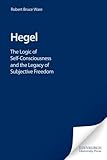Hegel : The Logic of Self-Consciousness and the Legacy of Subjective Freedom / Robert B. Ware.
Material type: TextPublisher: Edinburgh : Edinburgh University Press, [2022]Copyright date: ©1999Description: 1 online resource (264 p.)Content type:
TextPublisher: Edinburgh : Edinburgh University Press, [2022]Copyright date: ©1999Description: 1 online resource (264 p.)Content type: - 9780748610938
- 9781474473408
- online - DeGruyter
- Issued also in print.
| Item type | Current library | Call number | URL | Status | Notes | Barcode | |
|---|---|---|---|---|---|---|---|
 eBook
eBook
|
Biblioteca "Angelicum" Pont. Univ. S.Tommaso d'Aquino Nuvola online | online - DeGruyter (Browse shelf(Opens below)) | Online access | Not for loan (Accesso limitato) | Accesso per gli utenti autorizzati / Access for authorized users | (dgr)9781474473408 |
Frontmatter -- Contents -- Introduction -- CHAPTER 1. Hegel's Metaphilosophy and Historical Metamorphosis -- CHAPTER 2. Consciousness and Contradiction -- CHAPTER 3. Community and Cosmology In Ancient Greece -- CHAPTER 4. Philosophy and Fragmentation -- CHAPTER 5. Consciousness, Community and Cosmos -- CHAPTER 6. Community and Self -- Appendix: Self-containment and the Foundation of Set Theory -- Selected Bibliography -- Index
restricted access online access with authorization star
http://purl.org/coar/access_right/c_16ec
Hegel's philosophy has often been misunderstood. This volume offers a new interpretation of Hegel's thought, challenging traditional readings and reconsidering Hegel in terms of his understanding of his own philosophy. Robert Bruce Ware shows why Hegel believed that in grasping the essence of its age, a philosophy also indicates the direction of subsequent intellectual development. Contrary to received interpretations, Ware argues that the significance of Hegel's philosophy could not have been fully appreciated prior to the dramatic intellectual developments that have characterised the twentieth century. This interpretation involves a hermeneutic reciprocity, whereby Hegel on the one hand provides a philosophical foundaton for contemporary developments, while at the same time the latter assist in the clarification of Hegel's philosophy. The result is not only a clearer understanding of Hegel, but a deeper insight into the intellectual revolutions of our day. This book is unique in connecting Hegel to the tradition of analytic philosophy though the foundations of mathematical logic. Though these would seem to be unlikely companions, the author show that they serve to illuminate one another. Ware's application of set theory does much to clarify some of Hegel's more difficult claims, while remaining fully accessible to the non-specialised reader and engaging to a broad philosophical audience.
Issued also in print.
Mode of access: Internet via World Wide Web.
In English.
Description based on online resource; title from PDF title page (publisher's Web site, viewed 02. Mrz 2022)


